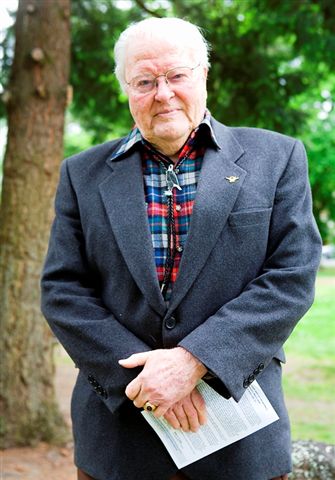Vaughn Davis Bornet, B.A. 1939, our oldest living undergraduate alumnus, will turn 94 on October 10, 2011. Enjoying normal health, he attends Rotary routinely on Thursdays. He shared many memories of Emory faculty. He writes, “Garland Smith is mostly responsible for my later editing skills, I should think. He gave F’s on a paper for ANY misspelled words, including AND without the N and THE without the H. In another single course he transmitted a lifelong love of poetry (exercised now and then). Gaty Workman in Abnormal Psychology took us to Milledgeville to what was then a genuine insane asylum. Much memorialized Dean Rece transmitted in one course more comprehension of the King James Bible than years of Sunday School. No, those books are not in chronological order, and Isaiah in addition to being spelled ‘that way’ is two books with vast time between them. Tom English offered his tour de force in the English Language, and the American Literature course introduced Walt Whitman in all his eccentricities (and beauty of phrasing). While I found vital qualities in Southernist Hayward J. Pearce and English history lover Ross McLean, my favorite, and friend, was youthful Mose Harvey of UC Berkeley whose concentration on Russia probably detoured him to a lifetime in the State Department. I remember him waving airily toward a pile of unbound documents and saying something like ‘Here in this office I have more information than the whole Harvard History Department!’ I believed. We used that Candler Library instead of textbooks in those Depression years (1935 to 1940); we didn’t even have texts in US and Western Civ courses. No offense to the History Department, but I did get a huge boost from several Journalism courses back then. And I’m so glad I sweated through International Law and Constitutional Law under Cullen Gosnell, heavily and routinely using the Law Library and those huge law books; again, no text.” He also remembers Leroy Loemker in the Philosophy Department.
Since earning his Honors degree in History at Emory, he has had an eventful life and written a long list of books in United States history. Just this year, he published Speaking Up for America: In the Rogue River Valley during the Vietnam War (2011), a collection of speeches and essays reflecting on those decades in US history, and Leaders and Issues at Southern Oregon College, 1963 to 1980 (2011). During World War II, he entered the Navy as Yeoman First class and then earned his commission. He retired as Commander from the Naval Reserves. He received his doctorate from Stanford University in 1951. He held a number of university positions; most notably, he was Professor of History and Social Sciences and the Chairman of the Social Sciences Division of the Southern Oregon University. For twenty years, he served on the Oregon Committee of the U.S. Civil Rights Commission. His articles have been published in many journals, including The American Archivist and The Historian. Dr. Bornet held a number of research positions at prominent institutions, such as the RAND Corporation, the Ford Foundation, the Commonwealth Club of California and the Institute of American History at Stanford University. His books cover a very wide range of important topics in twentieth-century United States History: Welfare in America (1960); Labor Politics in a Democratic Republic (1964); Herbert Hoover, President of the United States (co-authored, 1975); and The Presidency of Lyndon B. Johnson (1983). He wrote the long summary appraisal article ‘United States’ three times for encyclopedia yearbooks. His sketch appears in several Who’s Who publications of the Marquis Company, and he has the Distinguished Service Medallions of the American Heart Association and Oregon Heart Association.
Since 1963, he has called Oregon home. Still by his side is his choice for a mate: Beth W. Bornet, who was at their meeting in 1944 the 20 year-old President of the senior class at University of Nevada, Reno and hailed from tiny Susanville, California. She has been a leading volunteer honored by many organizations. They live in Ashland, Oregon. Their two children live in California and Connecticut.
This past Memorial Day, he spoke at the Mountain View Cemetery in Ashland. In his speech, he drew connections to Emory’s losses during World War II: “There were deaths from my own fraternity—my catcher when I pitched; the editor of the Emory Wheel newspaper; the dear son of the professor who mentored us Sigma Chis.”
Dr. Bornet’s autobiography appeared in 1995, An Independent Scholar in Twentieth Century America: The Autobiography of Vaughn Davis Bornet.
